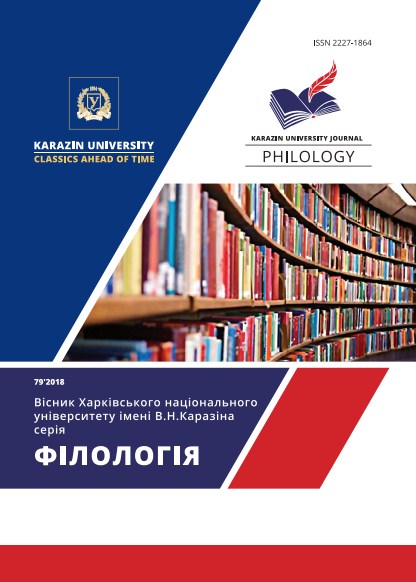The functioning of youth discourse in the sphere of Internet communications
Abstract
In the context of discourse theory, the computer discourse occupies a special place. The computer discourse can be regarded as a linguistic category that combines the signs of personality-oriented and status-oriented discourse. Computer discourse explores the peculiarities of the communicative environment, including the way communication and characteristics of the communicants.
The article deals with the functioning of youth discourse in the sphere of Internet communications. The evolution of the French language is taking place under the influence of social networks. Rapid development of Internet technologies means that, the neutralization of oral and written speech, the mixing of spontaneous and prepared speech, the processes of word-formation are actively taking place in the computer discourse. The youth discourse of Internet communications is the most open system in the modern French language and its vocabulary is constantly enlarging. The individuality of the user manifests itself in francophone youth blogs. There is a particular interest about blogs of French youth. Wealthy, stylistically marked language of teens differs from a standard variety of the French language with its own exceptional set of vocabulary words. Communication used in youth blogs has its own distinctiveness. While analyzing the lexical-semantic peculiarities of French young people blogs, a lot of jargon, slang words, expressions, conversions, and abbreviations can be observed. Language used in friendly emails is mostly popular among youth. Since there are no strict rules in French social media services, the breaking of orthographical and grammatical rules of the language can be observed.
Downloads
References
Література
Алексеев A. B. Записи в блоге как речевой жанр интернет-коммуникации: попытка описания / А. В. Алексеев // II Российская конференция по экологической психологии, 12-14 апр. 2000 г. : тезисы. – М. : Экопсицентр РОСС, 2000. – С. 240–245.
Барт Р. Система моды. Статьи по семиотике культуры / Р. Бард ; [пер. с фр., вступ. ст. и сост. С. Н. Зенкина]. – М. : Изд-во им. Сабашниковых, 2003. – 457 с.
Гогитидзе К. Французы самые активные блоггеры [Электронный ресурс] / К. Гогитидзе. – Режим доступа: http://itua.info/news/internet.
Горошко Е. И. Интернет-коммуникация: проблема жанра / Е. И Горошко // Жанры и типы текста в научном и медийном дискурсе: межвуз. сб. науч. тр. – 2006. – Вып. 4. – C. 165–175.
Ильин М. В. Слова и смыслы: опыт описания политических понятий / М. В. Ильин. – М. : РОССПЭН, 1997. – С. 14.
Компанцева Л. Ф. Интернет-комммуникация: когнитивно-прагматический и лингвокультурологический аспекты / Л. Ф. Компанцева. – Луганск : Знание, 2007. – 444 с.
Красных В. В. Основы психолингвистики и теории коммуникации: курс лекций / В. В. Красных. – М. : «Гнозис», 2001. – С. 200–201.
Пешё М. Контент-анализ и теория дискурса / М. Пешё // Квадратура смысла. – М. : Прогресс, 1999. – С. 302–336.
Серио П. Анализ дискурса во французской школе: дискурс и интердискурс / П. Серио // Семиотика: антология. – М. : Академический проект, 2001. – С. 549–562.
Чернявская В. Е. Лингвистика текста: поликодовость, интертекстуальность, интердискурсивность: учеб. пособие / В. Е. Чернявская. – М.: Книжный дом «Либроком», 2009. – С. 73.
Darot M. Usage de la langue: le register familier / M. Darot // Le français dans le monde. – 2009. – № 196. – Р. 78–80.
References
Alekseev, A. B. (2000) Zapisi v bloge kak rechevoy zhanr internet-kommunikatsii: popyitka opisaniya [Blog Entries as a Speech Genre of Internet Communication]. Moscow : Ekopsitsentr ROSS, pp. 240–245.
Bart, R.( 2003) Sistema modyi. Stati po semiotike kulturyi [Fashion system. Articles on semiotics of culture]. Moscow : Izd-vo im. Sabashnikovyih.
Gogitidze, K. Frantsuzyi samyie aktivnyie bloggeryi [The Frenchmen are the most active bloggers]. [Electronic resource] Available at: http://itua.info/news/internet.
Goroshko, E. I. (2006) Internet-kommunikatsiya: problema zhanra [Internet communication: the genre problem. Genres and types of text in the scientific and media discourse: interuniversity]. Zhanryi i tipyi teksta v nauchnom i mediynom diskurse, no. 4, pp. 165–175.
Ilin, M. V. (1997) Slova i smyislyi: opyit opisaniya politicheskih ponyatiy [Words and meanings: the experience of describing political concepts]. Moscow : ROSSPEN. [in Russian]
Kompantseva, L. F. (2007) Internet-kommmunikatsiya: kognitivno-pragmaticheskiy i lingvokulturologicheskiy aspektyi [Internet-communication: cognitive-pragmatic and linguocultural aspects]. Lugansk : Znanie. [in Russian]
Krasnyih, V. V.(2001) Osnovyi psiholingvistiki i teorii kommunikatsii: kurs lektsiy [Fundamentals of psycholinguistics and communication theory: a course of lectures]. Moscow : Gnozis, pp. 200–201.
Peshyo, M. (1999) Kontent-analiz i teoriya diskursa [Content analysis and discourse theory]. Moscow : Progress, pp. 302–336.
Serio, P. (2001)Analiz diskursa vo frantsuzskoy shkole: diskurs i interdiskurs / [Analysis of discourse in the French school: discourse and interdiscourse]. Moscow : Akademicheskiy proekt, pp. 549–562.
Chernyavskaya, V. E. (2009) Lingvistika teksta: polikodovost, intertekstualnost, interdiskursivnost [Linguistics of the text: polycode, intertextuality, interdiscursivity]. Moscow : Knizhnyiy dom Librokom, p. 73.
Darot, M. (2009) Usage de la langue: le register familier. Le français dans le monde. No.196, pp. 78–80.




